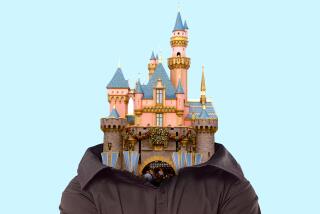For UC Irvine art history class, Disneyland becomes a research subject
- Share via
Disneyland may be a small world, but it still took Roland Betancourt 130 visits over a year and a half to prepare for his new art history class at UC Irvine.
Well, those trips were mostly about research, he joked in an interview this week.
His seminar class, known as Disneyland: Art, Architecture and Operation, was piloted this spring. It focuses on the history of theme parks and the design that goes into developing them.
The class had about 20 students last quarter and will expand into a full lecture course in spring 2020.
Betancourt, an associate professor of art history, said he approaches Disneyland the same way he studies medieval art — a field he’s trained in.
“So, I’m looking at an image of Christ or even a pitcher of water,” Betancourt said. “My interests are: Well, how did this object function? How did it fit into rituals? And, if it’s even an image of Christ, what did people do to it? Did they kiss it? Did they use incense? How did they pray around it — sing to it, read to it? What did they do?”
He asked his class to examine the Anaheim amusement park through a similar lens: How do the rides work? What does it take to operate them? How do workers stay in theme or in character while doing these things?
“The goal of the class is not to just look at the design end or to just look at the operational end, but to really think about how these things have to inherently come together,” Betancourt said.
The idea for the class spun out of a graduate course he taught several years ago on themed, artificial spaces throughout history, such as medieval churches and Las Vegas.
The structures “try to unsettle the location to make it seem, perhaps, like a heavenly place or a faraway land,” he said.
One of those class meetings focused on Disneyland. The park was a fitting choice for its own course, he said, because it is located nearby and “the perfect archive to study and think about these questions that interest me.”
Another reason, he said, is that the theme park is “an intimate part of the fabric of Southern California.”
“Many of our students have worked as cast members, will work as cast members or are doing it right now,” Betancourt said.
Lauryn Moles, a graduate student studying costume design, said she became so intimately familiar with the Matterhorn Bobsleds ride that she and Betancourt counted aloud every time they arrived at a brake zone.
“Being so close to the park, it’s easy to accept it as an institution of entertainment, but the class made me get to dissect the reasoning behind why Disneyland is such a successful institution,” Moles said. “It’s fascinating to see what Disney focuses its time upon to grow or confirm its brand.”
Students pore over literature about the park — digging through safety and security materials and supplemental publications such as the “E” Ticket, a fan-produced magazine. Betancourt said one of the fun things to do in class is to have students sort through different information to figure out what to trust as fact.
“That level of criticality with sources, I think, is so important today,” he said. “It’s nice to be able to teach that about Disneyland, because it’s the perfect storm.”
Though the class syllabus includes an optional trip to the theme park, the assignments don’t require students to go. Instead, students had the option of visiting the Irvine Spectrum Center and observing the Ferris wheel or merry-go-round rides rather than Space Mountain, Big Thunder Mountain Railroad or other Disneyland attractions.
“The class was a deep dive into how the Disneyland park works,” said Brooke Denny, an art history senior. “I can’t go to the park without wanting to analyze everything to see how it functions or to observe park protocols.”
Disneyland Resort officials could not be reached for comment about the class.
The recent opening of the park’s newest area, Star Wars: Galaxy’s Edge, means more Disneyland trips for Betancourt, which he said would also work well for the course.
“In many ways, it’s a nice capstone to the class because it deploys a lot of what we expect in the park but amplified,” he said.
Nguyen writes for Times Community News.
More to Read
Sign up for Essential California
The most important California stories and recommendations in your inbox every morning.
You may occasionally receive promotional content from the Los Angeles Times.













![Vista, California-Apri 2, 2025-Hours after undergoing dental surgery a 9-year-old girl was found unresponsive in her home, officials are investigating what caused her death. On March 18, Silvanna Moreno was placed under anesthesia for a dental surgery at Dreamtime Dentistry, a dental facility that "strive[s] to be the premier office for sedation dentistry in Vitsa, CA. (Google Maps)](https://ca-times.brightspotcdn.com/dims4/default/07a58b2/2147483647/strip/true/crop/2016x1344+29+0/resize/840x560!/quality/75/?url=https%3A%2F%2Fcalifornia-times-brightspot.s3.amazonaws.com%2F78%2Ffd%2F9bbf9b62489fa209f9c67df2e472%2Fla-me-dreamtime-dentist-01.jpg)
